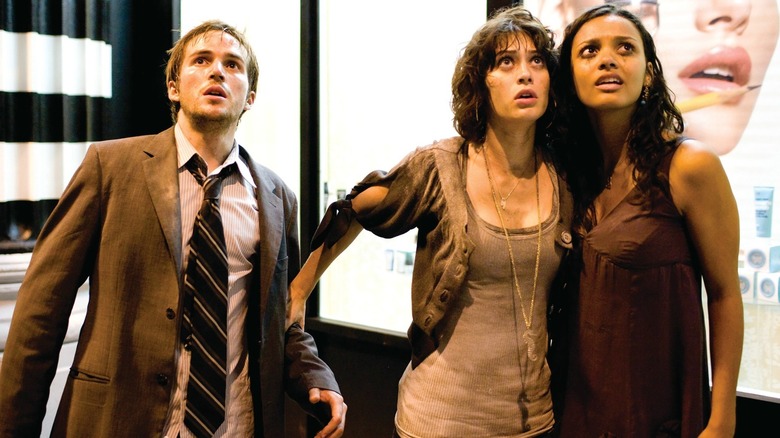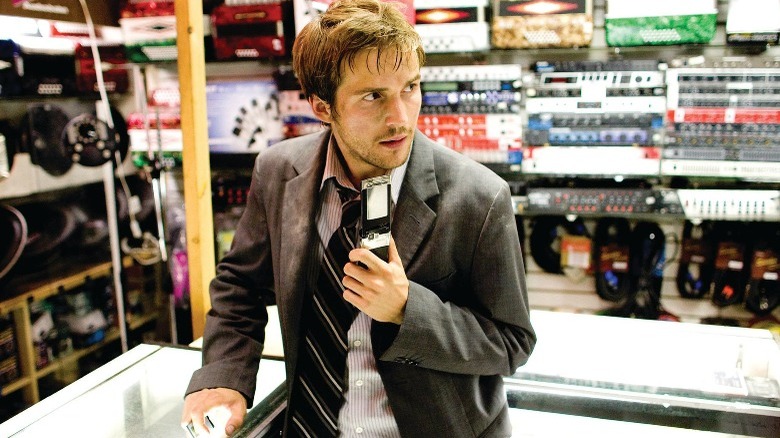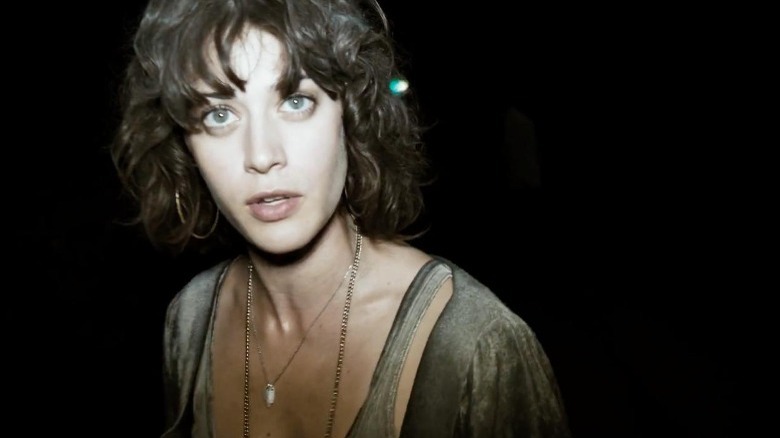Matt Reeves Questioned Why He Was Picked To Direct Cloverfield
In Matt Reeves' "Cloverfield," the severed head of the Statue of Liberty crashes near bystanders exiting a going-away office party, while a monster rampages New York City. The events of the film are relayed via found footage, and the monster in question emerges as an unconventional, terrifying entity, whose origins remained mysterious before "Cloverfield" ballooned into a film franchise. This, paired with cryptic Lovecraftian puzzles surfacing on the web as a part of the film's viral marketing campaign painted "Cloverfield" as a puzzle itself — audiences were intrigued by the idea of a creature feature that teased ample meta-theories and launched mini-ARGs to help create hype around Reeves' found-footage horror. Moreover, when the first trailer for the film was released, it was deliberately untitled, leaving audiences baffled about the nature of the film, and what exactly it had to offer.
Turns out, Reeves himself was baffled when he was chosen as the one to helm a project that was being guarded as a precious secret at the time. Long-time friend and fellow film director J.J. Abrams, who produced "Cloverfield," was enthusiastic about having Reeves on the project, and while Reeves shared the shared enthusiasm, he was unsure as to whether he was the right choice for what was essentially a monster flick. Thankfully, Abrams convinced him that this was the perfect opportunity for Reeves to flesh out a character-focused story that had realistic roots and presented an overdone trope in a fresh, interesting way.
A naturalistic aesthetic
"Cloverfield" opens with a rather mundane premise: Rob (Michael Stahl-David) attends a farewell party, on the occasion that he's bagged a new position in Japan. Rob's friends gather at the get-together, including Beth (Odette Yustman) who Rob never contacted after a one-time sexual encounter. After she brings some random dude to the party, Beth and Rob have an argument — up until this point, "Cloverfield" touches upon the fluctuating interpersonal relationships we often share, and there is nothing inherently interesting about Rob or Beth's story. However, that is the point, as it recontextualizes the smaller squabbles and missed opportunities in life against a city-wide monster attack. Does anything apart from survival matter at this juncture?
Reeves tackles this core theme in smart, ingenious ways, weaving in the sudden catastrophe with the need to preserve the bonds we often take for granted. Rob and Beth's qualms about their relationship mean nothing when faced with a life-altering threat — this is exactly why Rob and his friends endanger themselves to rescue Beth. Here's what Reeves told IGN regarding his initial confusion about helming "Cloverfield," and how extensive discussions with Abrams paved the path for a rare opportunity to work on something truly special.
"I was very taken with it, but I was like, 'This is huge, it's visual effects, it's a monster movie. Why are you thinking of me?' The big thing for J.J. and for Bryan [Burk] was that my concerns primarily — and everything that I've done so far and everything that I'm interested in...it's been all character-based. I'm very interested in naturalism and realism and we tried to have that kind of tone...They were like, 'Look, there's no question, we know you love movies and you can get the monster part...we're interested in what you would do in terms of the tone. In how you would do that and what you would do with the characters.'"
The opportunity to do something new
Reeves also went on to explain that the over-the-top nature of the monster invasion might have potentially led to "an outrageous idea" that would spur audiences to suspend reality further, but he was more interested in doing something different. With no pressure to fit "Cloverfield" into the mold of a big-budget blockbuster, Reeves could cast actors who were mostly unknown, which helped reinforce how ordinary the premise is in the beginning. Moreover, as it was much easier to keep the details of a project under wraps at the time, Reeves thinks "Cloverfield" inspired a "sense of discovery" in everyone involved with the project:
"There was that sense of discovery. And so we all got very excited about the idea of putting together this trailer for a movie that no one had heard of...And that would enable there to be that sense of discovery from when we were all younger, that there wasn't so much media saturation. And so that was definitely part of the concept."
One of the reasons why "Cloverfield" works is that it utilizes the found-footage trope in convincing ways, as it not only functions as proof of the disaster but also touches upon the struggles of those caught in the monster's path of destruction. No one is ever truly prepared for such a calamity, let alone everyday folks who are simply trying to live their lives, and "Cloverfield" highlights this truth within the confines of an exhilarating creature feature. It also raises questions about the monster's perspective — is it aware of the horrors it is responsible for? Or is it simply making its way through an unknown city, terrified of the inhabitants who are attacking him? "Cloverfield" deliberately keeps things open-ended, and urges audiences to speculate further.


